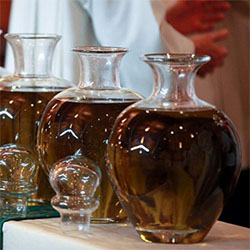Ministry to the Sick
Requests for Anointing of the Sick
Non-Emergencies
Non-emergency priest visits to the home or hospital should be requested by calling the office during regular office hours.
Requests for non-emergency anointings may also be made at the church at anytime.
Requests for homebound or nursing home visits
on a regular basis, temporary or long-term, are set up through the church office.
For Emergencies ONLY
When someone is under the threat of death, please call the office at 252-237-3019.
If after office hours or on weekends, press option 9.
Additional assistance in locating a priest may also be found with Deacon Michel at 252-230-4668.
Please be sure to leave a clear message with your name and phone number when you call.
Unción de los Enfermos
Para solicitar el sacramento de la unción de los enfermos en caso de que no sea de emergencia se debe llamar a la oficina para que el sacerdote visite al enfermo en el hogar o en el hospital. En caso de emergencia, en peligro de muerte, llame a la oficina al 252-237-3019. Presione el número 9 para emergencia y deje un mensaje claro, con su nombre y el número de teléfono. Para asistencia adicional puede llamar al Diácono Michel al 252-230-4668.
What is Anointing of the Sick?
The Rite of Anointing tells us there is no need to wait until a person is at the point of death to receive the Sacrament. A careful judgment about the serious nature of the illness is sufficient. The Sacrament may be repeated if the sick person recovers after the anointing but becomes ill once again, or if, during the same illness, the person's condition becomes more serious. A person should be anointed before surgery when a dangerous illness is the reason for the intervention (cf. Rite of Anointing, Introduction, nos. 8-10).

Moreover, "old people may be anointed if they are in weak condition even though no dangerous illness is present. Sick children may be anointed if they have sufficient use of reason to be comforted by this sacrament. . . . [The faithful] should be encouraged to ask for the anointing, and, as soon as the time for the anointing comes, to receive it with faith and devotion, not misusing the sacrament by putting it off" (Rite of Anointing, nos. 11, 12, 13).
Only bishops and priests may be ministers of the Sacrament of the Anointing of the Sick. A penitential rite followed by the Liturgy of the Word opens the celebration. Scripture awakens the faith of the sick and family members and friends to pray to Christ for the strength of his Holy Spirit. The priest lays his hands on the head of the sick person. He then proceeds to anoint, with the blessed Oil of the Sick, the forehead and hands of the sick person (in the Roman Rite). He accompanies these acts with the words, "Through this holy anointing may the Lord in his love and mercy help you with the grace of the Holy Spirit. May the Lord who frees you from sin save you and raise you up" (CCC, no. 1513).
For those who are about to depart from this life, the Church offers the person Penance, Anointing of the Sick, and the Eucharist as Viaticum (food for the journey) given at the end of life. These are "the sacraments that prepare for our heavenly homeland" (cf. CCC, no. 1525). These rites are highly valued by Catholics as powerful aids to a good death. Since Holy Communion is the effective sign of Christ's Paschal Mystery, it becomes for the recipient the opportunity to unite one's own suffering and dying to that of Christ with the hope of life eternal with him. The special words proper to Viaticum are added: "May the Lord Jesus protect you and lead you to everlasting life. Amen."
-From USCCB